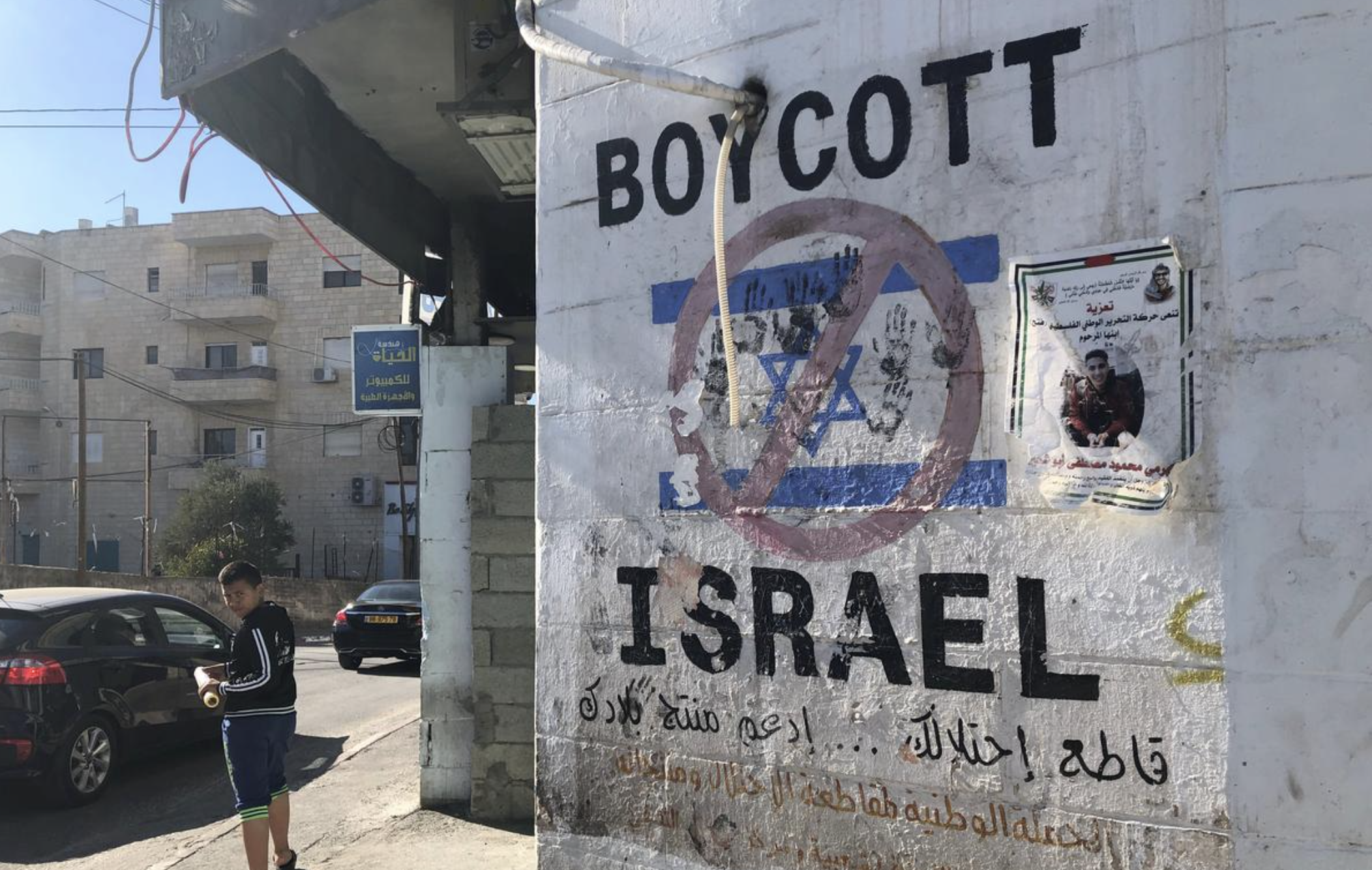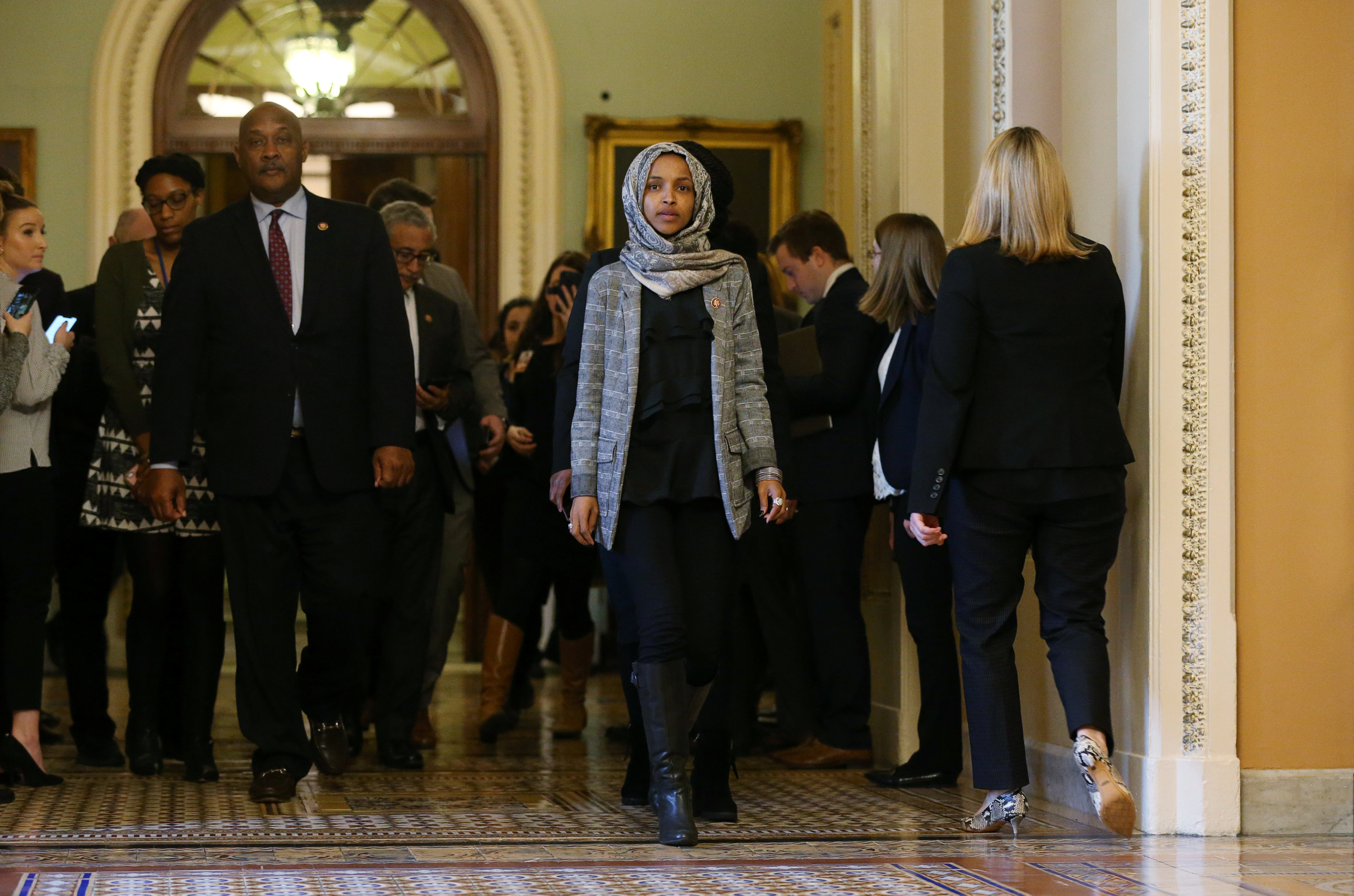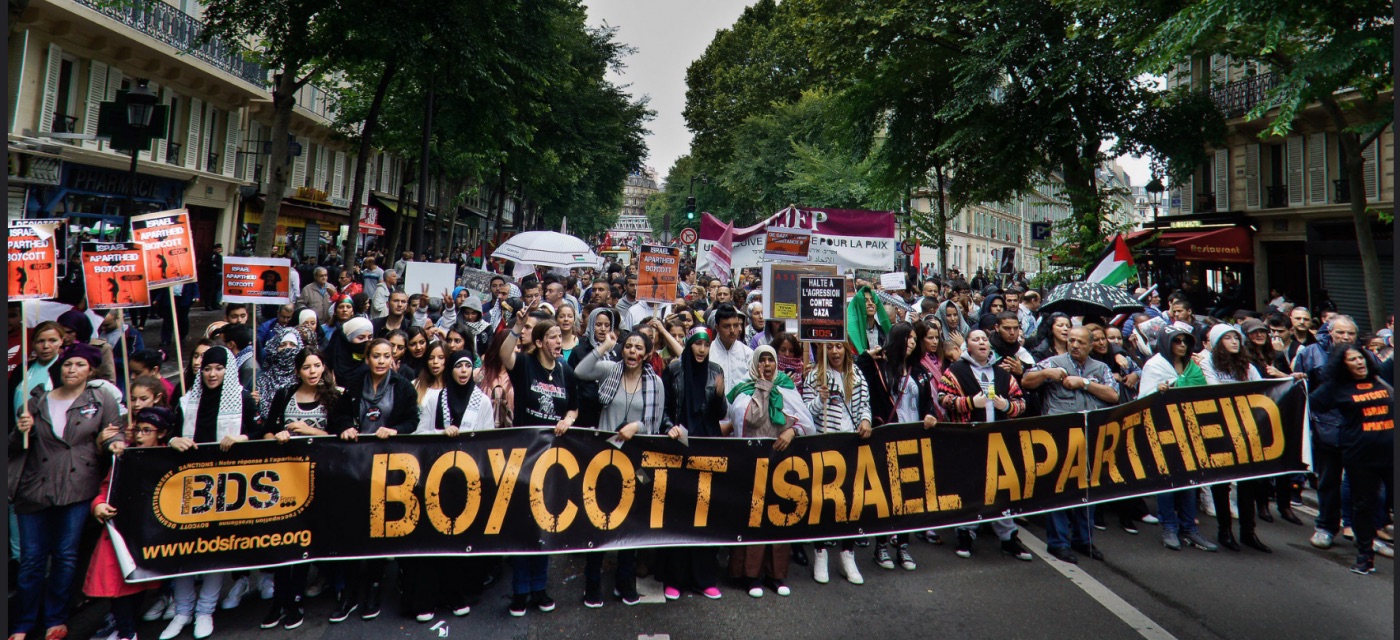 A Palestinian boy looks on near a graffiti boycotting Israel in Bethlehem, in the Israeli-occupied West Bank November 3, 2018. Picture taken on November 3, 2018. REUTERS/Stephen Farrell/File Photo
A Palestinian boy looks on near a graffiti boycotting Israel in Bethlehem, in the Israeli-occupied West Bank November 3, 2018. Picture taken on November 3, 2018. REUTERS/Stephen Farrell/File Photo A new report by a Tel Aviv-based strategy and leadership group outlines how intersectionality is posing a threat to the organized American Jewish community.
Published in June by the Reut Group, the report, titled “Navigating Intersectional Landscapes: Rules for Jewish Community Professionals,” argues that the American Jewish community is divided over many viewpoints on Israel and tensions are being exacerbated by those who are using intersectionality to promote anti-Israel agendas.
The 42-page report was produced with the support of the Los Angeles-based Julis Foundation for Multi-Disciplinary Thinking following a yearlong partnership between the Reut Group and the Jewish Council for Public Affairs (JCPA), which is made up of 125 Jewish Community Relations Councils (JCRCs) and 17 national Jewish agencies, including the Anti-Defamation League and the American Jewish Committee.
According to the report, the goal of the Reut/JCPA partnership is to “bolster the community relations field’s response to contemporary challenges within the Jewish community and anti-Israel campaigns. During this partnership, we identified the potential threat of intersectional movements to the Jewish community.”
What is Intersectionality?
In a 1989 paper for the University of Chicago Legal Forum, Kimberlé Crenshaw, a law professor at Columbia University and UCLA, developed a theory that African American women face a unique form of oppression that is not sufficiently explained by racism or sexism.
Crenshaw coined her theory “intersectionality,” which the Reut report argues “holds that different forms of oppression and discrimination overlap and are experienced in a unique manner by individuals that fall within several biological, cultural and social categories, such as race, gender, religion, ability, sexual orientation, age and class.”
Today, the report states, the term intersectionality embraces more than Crenshaw’s original definition, and social justice coalitions understand it as a call to support other disenfranchised groups, even if their causes do not seem connected.
In a Feb. 8, 2019, op-ed, “The Progressive Assault on Israel,” New York Times columnist Bret Stephens defined intersectionality as “the idea that the oppression of one group is the oppression of all others.”
“Under intersectional umbrellas,” the report states, “members of Black, Latino and LGBTQ communities regularly stand in solidarity with anti-Israel and BDS-promoting groups.”
In 2014, demonstrators in Ferguson, Mo., protested the death of 18-year-old African American Michael Brown, who was shot and killed by a white police officer. That demonstration coincided with Israel’s Operation Protective Edge battle in Gaza. The report states that among those calling out police shootings of African Americans were pro-BDS protesters promoting “the #PALESTINE2FERGUSON campaign in an attempt to draw a parallel between the Palestinian struggle and the issue of police brutality against African Americans.”
From #Ferguson to #Palestine …
Occupation is a crime.#palestine2ferguson #FreePalestine pic.twitter.com/XqGwltlJAa— Palestine Social (@PalestineSocial) November 27, 2014
According to the report, this was a turning point in how Israel was viewed through the lens of intersectionality.
“In the recent years since Ferguson, we can see how anti-Israeli activity is seen as a right social cause and support for BDS as a legitimate solidarity cause,” Reut Group CEO Eran Shayshon told the Journal from Israel in a phone interview.
The report also links the rise of intersectionality to events including the 2017 Women’s March, led by leaders Linda Sarsour and Tamika Mallory, who have been accused of being anti-Semitic, and the 2017 Chicago Dyke March, during which three women were told they could not march in the event because they were carrying flags with Stars of David, a “Zionist symbol.”
All the while, support for Palestinians in the context of its conflict with Israel has become an increasing presence in intersectional coalitions, the report states, noting, “the Palestinian cause has been widely adopted as a core and prominent threshold for solidarity by many marginalized groups.”
Where Do American Jews Fit In?
According to the report, American Jews are often omitted from intersectional spaces, despite a history of standing with African Americans during the civil rights era, because contemporary American Jews are not seen today as marginalized but as privileged.
“Jewish identity in America is mutating from a self-perception of being a marginalized and disempowered community to one increasingly being seen by outsiders as a privileged social group,” the report states. “As a result, Jews are often excluded from intersectional coalitions of solidarity formed among members of oppressed groups.”
Shayshon said this exclusion of Jews from intersectional spaces is anti-Semitic.
“Intersectionality in its current form mainstreams subtle anti-Semitism because it combines conspiratorial things like the disproportionate power and influence of Jews and asks Jews to renounce their privilege and claims of prejudice, and makes the Jewish cause to defend the Jewish state illegitimate,” he said. “Anti-Zionism has become a litmus test for progressive communities to make.”
Shayshon added it was incumbent on his organization to understand how intersectionality is affecting the American Jewish community because “the challenges facing the Jewish community are critical to the resilience of the Jewish people and also to Israel, and Israel has been inserted into the conversation of intersectionality.”
Breaking Down the Report
The report classifies the American-Jewish community’s perspectives about Israel into four categories, or tribes:
1. Aligners, or those who “consider Israel to be an integral part of their Jewish identity and generally support the State of Israel.”
2. Moderate Critics, who, “while pro-Israel, tend to oppose the Jewish Establishment’s traditional, unconditional support for Israel.”
3. Harsh Critics, who “hold highly critical views of Israel’s policies, most often with regards to Israel’s continued control of the Palestinians.”
4. Radicals, “anti-Zionists who denounce Israel.”

In the “new anti-Semitism” that is anti-Zionism, the report states, the United States is seeing “the ‘Corbynization’ of progressive politics,” a reference to British Labour Party leader Jeremy Corbyn, who is, according to the report, “mainstreaming new anti-Semitism” into the ideologies of his political party.
If London is at the center of much of the anti-Israel activity in Europe, the center of anti-Zionism in North America is San Francisco, Shayshon said. “We’ve studied the dynamic of anti-Israeli groups and clearly the geographical hubs in the U.S. are metropolitan areas. In the San Francisco Bay area, there is a concentration of anti-Israeli groups, which serve as a hub for a long list of anti-Israeli groups all over North America. Clearly [UC] Berkeley is such a hub. SJP (Students for Justice in Palestine), their hub is at Berkeley.”
Stating that “we know that the anti-Israeli movements flourish in progressive hubs,” Shayshon added, “Israel has been losing its progressive credibility.”
The report states that increasing criticism of Israel among far-left members of the Democratic Party poses a “threat to the future of traditional U.S. bipartisan support for Israel.”
Among the incidents the report cites backing these claims is a 2003 episode involving a San Francisco-based rape crisis center, San Francisco Women Against Rape, that defined itself as anti-Zionist and asked potential interns and volunteers if they would be willing to take a stance against Zionism, even though the Israeli-Palestinian conflict was unrelated to its mission.
Another article the report references was published on Oct. 8, 2018, in the Forward, highlighting how Tucson Jews for Justice, while protesting President Donald Trump’s policies on child separations and the Muslim travel ban, faced bullying from far-left groups for not condemning Israel. This was part of “a national trend of harsh treatment of Jews in progressive spaces,” according to the Forward.
The report also discusses recent events involving Rep. Ilhan Omar (D-Minn.), whose remarks on Twitter about Israel and the America Israel Public Affairs Committee (AIPAC) were widely deemed anti-Semitic, and Mallory, the Women’s March leader, who refused to condemn what many deemed anti-Semitic remarks made by Nation of Islam leader Louis Farrakhan.

Shayshon went further, saying, “Many Israelis believe the relationship between Israel and the U.S. has never been stronger because of the Trump-[Prime Minister Benjamin] Netanyahu relationship and many talk about the possible blowback when a Democratic administration succeeds it.”
Shayshon said he was more concerned about anti-Semitism on the political left than he was with anti-Semitism from the right. “On the right, it is much more about a challenge of physical insecurity, like what happened in Pittsburgh, but anti-Semitism on the left is more threatening in the sense that it is polarizing the Jewish community. It drives a wedge between Jewish communal organizations and many young Jews and as a result loses its vitality.”
The report goes on to state that intersectionality not only is driving a wedge between members of the American Jewish community but also is threatening “Israel’s status within the U.S. Jewish community from a unifying issue into a divisive one.”
The report also highlights how the younger generation of American Jews is distancing itself from Israel and has a distrust of Jewish communal organizations.
Shayshon said anti-Israel movements like BDS (boycott, divestment and sanctions) are popular among young people who are susceptible to viewpoints masking as tikkun olam.
“I have no doubt that most people who support BDS are not motivated by an anti-Israel view or anti-Zionism,” he said. “Many times their position is a submission to the anti-Israeli spirit of the times, which [the intersectionality] ideology aims to create.”
Our democracy is built on debate, Congresswoman! I should not be expected to have allegiance/pledge support to a foreign country in order to serve my country in Congress or serve on committee. The people of the 5th elected me to serve their interest. I am sure we agree on that! https://t.co/gglAS4FVJW
— Ilhan Omar (@IlhanMN) March 3, 2019
How to Fight Back
The report encourages Jewish groups to engage with Israel’s critics, stating, “Jewish communal broad-tent engagement efforts should specifically focus on engaging Harsh Critics who may give Israel the benefit of the doubt, maintain a meaningful connection to Israel and disapprove of the BDS movement.”
The report goes on to say that while Jewish organizations may have a tendency to lessen its emphasis on Israel to remain relevant among young people, the better response is doubling down on Israel engagement.
In combating the growing antagonism toward Israel, the report recommends that the Jewish community broaden its tolerance for “legitimate discourse on Israel” and avoid blacklisting organizations that hold differing viewpoints on issues like the boycotting of West Bank products, stating, “There is a low likelihood of a divided Jewish community reaching common ground on several eminent issues.”
The report also advises Jewish organization to find new allies, including Jews of color, to demonstrate that the pro-Israel movement also has diverse, intersectional support. Among some of the smaller, niche organizations the report cites that can help play a role include Moishe House, which provides subsidized living for young adult Jews who commit to holding Jewish programming in their homes, and OneTable, which provides millennials with tools and resources to hold Shabbat dinners. They too, according to the report, can be bridges between Israel’s critics, Jewish communal life and Israeli society.

Moving Forward
Shayshon said the report’s focus on how intersectionality presents new challenges for the American Jewish community stems from his group’s belief that the American Jewish community relations field is the “most potent platform of the Jewish community to fight anti-Israeli movements.”
However, he added, “We don’t see the sense of urgency in the Jewish community regarding intersectionality. One of the main threats of intersectionality in its current format is it mainstreams anti-Semitism and we see how the Jewish community is unable to coalesce around fighting these issues.”
Shayshon said he hoped the publication and dissemination of the report leads to change in how the community interacts with the intersectionality question. “We are not just a think tank that publishes papers and hopes the words will take effect,” he said. “This is part of a long couple of years’ effort to strengthen the community relations field with our strategic partner for the U.S., JCPA.”
“We hope research can trickle down and become pillars of operations for the JCRC network,” he said. “That’s our plan.”























 More news and opinions than at a Shabbat dinner, right in your inbox.
More news and opinions than at a Shabbat dinner, right in your inbox.